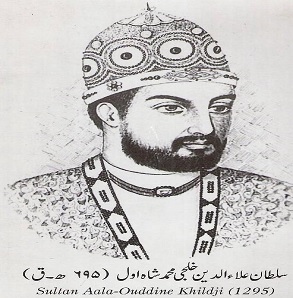In this article, we will discuss about administrative, military, revenue and economic reforms done by the Sultan Alauddin Khilji. We have prepared this short note from the help of NCERT books and Wikipedia.

He Administrative Reforms
Alauddin Khilji was a strong and efficient ruler. He set up a strong central government. He was the highest authority of the state and he believed in the history of divine right. The Sultan started considering himself a representative of God or “Shadow of God”. As a result, he restricted matrimonial relations among nobles and officers as well as he prohibited secret meetings and parties etc. He appointed spies to keep an eye on them and tried to confiscate their excess wealth. He prohibited wine and gambling and refrained himself from these activities. Alauddin Khilji prevented the interference of Ulemas in administration.
Military Reforms
- Alauddin Khilji maintained a strong and huge standing army to safeguard his empire.
- He introduced the system of branding of horses (dagh) and maintenance of descriptive register of soldiers to prevent false musters and corrupt practices.
- Alauddin abolished the Jagir system and paid the salaries in cash.
- He fixed the pay of soldiers at 234 tankas a year, with an additional 78 tankas for a soldier maintaining two horses.
- Ariz-i-Mumalik was in charge of the appointment of soldiers.
Revenue Reforms
- Alauddin Khilji introduced scientific method of measurement of land for the assessment of land revenue.
- He imposed heavy taxes on the Sardars, Jagidars and Ulemas.
- Jazia was imposed on non-Muslims. They had to pay it along with other taxes like pilgrim tax, octroi etc.
- He increased the salaries of revenue officials to check bribery and corruption.
- The post of a special officer called “Mustakhraj” was created to collect land revenue from peasants.
- He took steps to safeguard the peasants from the demands of corrupt revenue officials by imposing strict punishments even for petty offences.
Economic Reforms (Market Regulations)
Alauddin Khilji introduced the market regulations to help soldiers and to make ends meet. Prices of all articles of common use were fixed. Separate department and special officers were appointed to regulate the market. The price fixed in the capital was applicable to all towns.
Price List
- Wheat per mana 7 1/2 jitals
- Rice per mana 5 jitals
- Pulses per mana 5 jitals
- Barley per mana 4 jitals
- Sesamum per mana 3 sers 1 jital
- Ghee per 2 1/2 sers 1 jital
- Sugar per 1 1/2 sers 1 1/2 jitals
- One horse 100 to 200 tankas
- One cow 4 to 5 tankas
- Male slave 100 to 200 tankas
- Female slave 40 to 50 tankas
Grains were stored in government granaries. The storage was meant for emergencies like times of scarcity and famine. Any trader or vendor who cheated in weights and measurements were punished with cutting of an equal weight of flesh from his body (thighs).
The last days of Allaudin Khilji were unhappy. He was poisoned by his trusted general Malik Kafur. He died in 1316 CE.
Read also about:>>
23 Comments on “Reforms of Alauddin Khilji : Administrative, Military, Revenue & Economic”
Thank you so much Sir.
Very good answer that I received. It help me as a best teacher
Tq so much sir
Awesome answer I have got!
I appreciate the writer.
Thanks it is so useful information thank you so much
Good Explanation…..👍
Found it really helpful! 👌Thanks a lot…☺
Thank u for this content….
Very nice
Contents are good.
Well elaborated.
But not up to the mark from upsc point of view.
Thanks a lot.
It is really very helpful.
thank you very much for who made this site it helped me to make my history lesson understand’
Very helpful 😁
Super helped this website
It was really helpful .
Expect more from you😊
thank you so much sir
I need to all upsc PDF so I hope you will be must help me….
Thankful to you..ll
Thanks sir
THANKYOU FOR THIS CONCRETE AND VALUABLE INFORMATION.
Thanks to whoever wrote this, it made doing my project so easier!!
thnku tym pe kuj acha milgya smjne ko
Super i get all answers
I can’t believe marvelous 🤩🤩